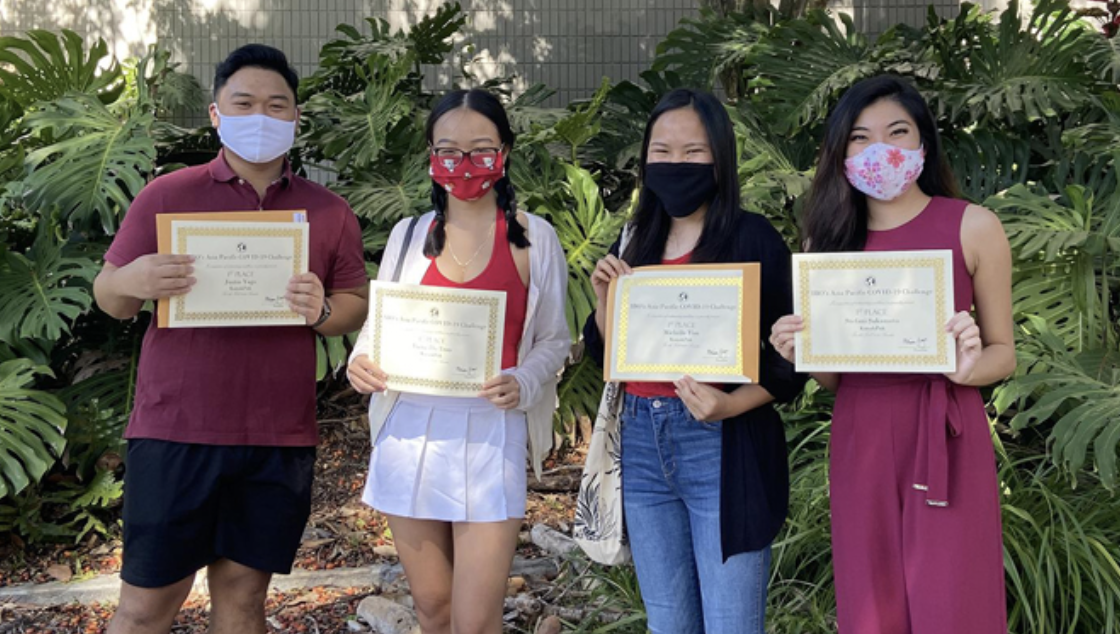Team members from KanakPak: Justin Rei Yago, Tiana Tran, Michelle Yim and Stefani Sakamoto
Winners of a competition designed to give University of Hawaiʻi students an opportunity to formulate creative solutions to problems caused by COVID-19 and its impacts on the Asia-Pacific region have been announced.
The International Business Organization (IBO) at UH Mānoa’s Shidler College of Business hosted its inaugural “IBO’s Asia Pacific COVID-19 Challenge” last semester from September 14 to December 6, 2020. A total of $5,500 in cash prizes was presented to the top three teams. Participating teams presented a complete business startup plan including sections on strategy, feasibility, financials, marketing and distribution. Teams were also assigned an experienced international business mentor to provide guidance throughout the process.
Winning teams
- First Place ($2,500) “KanakPak”—Tiana Tran, Michelle Yim, Stefani Sakamoto and Justin Rei Yago
- Second Place ($2,000) “Momentum Initiative”—Isaiah Sabey, Jordan Abanto and Alex Tyau
- Third Place ($1,000) “Upward Growth Through Vertical Agriculture”—Sean Suetsugu and Korynn Grenert
KanakPak
Team KanakPak created a product to connect the Japanese and Hawaiian cultures. The company proposed collaborating with local businesses to combine cultural foods and snacks into one package that visitors can buy to support the tourism industry. They would also work with popular hotels like Sheraton Waikiki and the Kahala Hotel and Resort to market and distribute their product to Japanese tourists.
“Our goal was to empower those businesses while sustaining interest in Hawaiʻi from around the world by providing a channel to promote Hawaiʻi‘s culture through food,” Yim said.
KanakPak mentor David Li said that he was proud to have mentored his team despite the 18-hour time difference between Hawaiʻi and his workplace in Hong Kong. He added that he was impressed by KanakPak’s creative thinking, resourcefulness and ability to learn from the experience.
Valuable experiences

The teams said they learned and improved on many soft skills including time management, cultivating an entrepreneurial mindset, critical thinking and developing an international perspective. Sabey from Momentum Initiative said the most valuable lesson his team learned was the importance of having a good message and a compelling story.
“I think I can speak for a majority of the teams that competed, but our team learned how to carry a vision and create an impactful solution to our state’s most pressing problems,” he said.
Grenert from Upward Growth Through Vertical Agriculture said they learned how to find investors, create a marketing plan and do budget estimations. The mission of their project was to introduce vertical farming systems and equipment to local households so they can grow their own food to decrease food insecurity brought on by the pandemic.
Competition’s future

The prizes for this year’s competition were donated by local organizations and businesses including FEI Executives International Hawaii Chapter, Redondo’s, Araki Hiroya Soroban School, Pacific Asian Center for Entrepreneurship and Shidler Alumni Association.
IBO hopes to continue hosting academic competitions such as the COVID-19 challenge. It looks forward to creating a positive impact in the community and for its members in a way that embodies international excellence.
“Given the overwhelming support and success of this challenge, I envision that IBO, as well as other clubs, will continue to challenge students outside of college to deepen both their knowledge and perspective of the world,” IBO President Melissa Yago said.
For more, visit the Shidler College of Business website.
This work is an example of UH Mānoa’s goal of Enhancing Student Success, one of four goals identified in the 2015–25 Strategic Plan, updated in December 2020.


